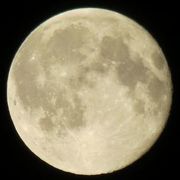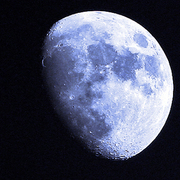|
Home
|
Jul 18, 2019
This week’s themeWords originating in the moon This week’s words superlunary meniscus moonstruck blue moon lunule 
Blue moon (figurative), Viewed from Port Coquitlam, Canada
Photo: Ursus sapien / Wikimedia 
Blue moon (literal), Viewed from Cape Cod, Massachusetts
Photo: Steve
A.Word.A.Day
with Anu Gargblue moon
PRONUNCIATION:
MEANING:
noun: A long time.
ETYMOLOGY:
From blue, from Old French bleu + moon, from Old English mona. Earliest
documented use: 1702.
NOTES:
The term typically appears in the phrase “once in a blue moon”,
meaning rarely or not often. In reality, a blue moon occurs on average
once every 2.7 years. So what is a blue moon? Well, in a year you see 12
full moons, but sometimes there’s a bonus full moon. This extra full moon
is called a blue moon, though it’s not really blue. If you want to get technical, in a season of three months you typically get three full moons. If there are four, the third full moon is called a blue moon. Sometimes, the moon actually shows up in blue, but it has nothing to do with the above discussion -- nothing to do with a full moon. The color is due to the smoke or dust particles from forest fires, volcanic eruptions, etc. So why is that extra moon called a blue moon? Nobody knows. Perhaps the literal blue moon got conflated with the extra full moon because both occurrences are unusual and don’t occur that often. USAGE:
“I started to appreciate this weird thing for what it was. Just two
people who rarely have time to see each other, who aren’t quite right
for each other, who enjoy each other’s company every once in a blue moon.” Natalie B. Compton; Midair Meeting Lands in Reality; Los Angeles Times; Jun 22, 2019. See more usage examples of blue moon in Vocabulary.com’s dictionary. A THOUGHT FOR TODAY:
The world is a looking glass and gives back to every man the reflection of
his own face. -William Makepeace Thackeray, novelist (18 Jul 1811-1863)
|
|
Subscriber Services
Awards | Stats | Links | Privacy Policy
Contribute | Advertise
Awards | Stats | Links | Privacy Policy
Contribute | Advertise
© 1994-2026 Wordsmith